| | Mathison Museum of Natural History |  |
|
+23Ana Rakel spacelab Gecko08 Taos Megaptera Duck-Anch-Amun 75senta75 Kikimalou Saarlooswolfhound Bonnie RtasVadumee landrover Advicot Roger rogerpgvg lucky luke Caracal pipsxlch widukind SUSANNE endogenylove bmathison1972 27 posters |
|
| Author | Message |
|---|
bmathison1972
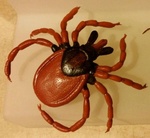
Country/State : Salt Lake City, UT
Age : 52
Joined : 2010-04-13
Posts : 6710
 |  Subject: Re: Mathison Museum of Natural History Subject: Re: Mathison Museum of Natural History  Tue Feb 09, 2021 1:09 pm Tue Feb 09, 2021 1:09 pm | |
| Species: Opisthopora, gen. sp. (earthworm, life cycle) About the Figure: Manufacturer: Safari Ltd. Series: Safariology - Life Cycle of an Earthworm Year of Release: 2015 Size/Scale: The four stages are not in scale with each other. The adult figure is 8.5 cm across its widest points, but measured along the midline it comes to 20.8 cm, which puts it in the scale of 1:1 for some species [scale species-dependent] Frequency of species in toy/figure form (at time of posting): Rare [earthworms, generally] Miscellaneous Notes: Earthworms are rarely made, and when they are it is usually for the purpose of novelty toys. Few major companies have tackled them. In addition to this figure, I also have one each by Bullyland and Kaiyodo, and only Kaiyodo marketed theirs at the species level. About the Animal: Geographic distribution: Worldwide [individual species more restricted] Habitat: Leaf litter, soil, compost Diet: Decaying organic material IUCN Status (at time of posting): N/A [species-dependent] Miscellaneous Notes: Earthworms are hermaphroditic, and two worms fertilize each other. Copulation and reproduction are several processes, however, and an individual earthworm regulates the mixing of sperm and egg and can become the genetic mother of some of its offspring and genetic father of others. Some earthworms are parthenogenetic, meaning adults can produce viable eggs without reproduction. [You must be registered and logged in to see this image.] |
|
  | |
Bonnie
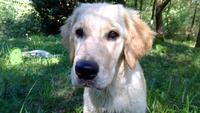
Country/State : UK
Age : 19
Joined : 2020-10-14
Posts : 5584
 |  Subject: Re: Mathison Museum of Natural History Subject: Re: Mathison Museum of Natural History  Tue Feb 09, 2021 3:18 pm Tue Feb 09, 2021 3:18 pm | |
| Wow- so realistic!  |
|
  | |
widukind
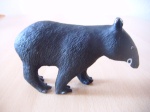
Country/State : Germany
Age : 48
Joined : 2010-12-30
Posts : 45745
 |  Subject: Re: Mathison Museum of Natural History Subject: Re: Mathison Museum of Natural History  Tue Feb 09, 2021 5:57 pm Tue Feb 09, 2021 5:57 pm | |
| |
|
  | |
rogerpgvg
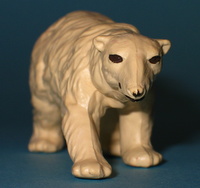
Country/State : UK
Age : 54
Joined : 2016-04-29
Posts : 3894
 |  Subject: Re: Mathison Museum of Natural History Subject: Re: Mathison Museum of Natural History  Tue Feb 09, 2021 6:39 pm Tue Feb 09, 2021 6:39 pm | |
| Interesting! Why is one of the worms grey and thinner at one end? |
|
  | |
bmathison1972

Country/State : Salt Lake City, UT
Age : 52
Joined : 2010-04-13
Posts : 6710
 |  Subject: Re: Mathison Museum of Natural History Subject: Re: Mathison Museum of Natural History  Tue Feb 09, 2021 6:48 pm Tue Feb 09, 2021 6:48 pm | |
| - rogerpgvg wrote:
- Interesting! Why is one of the worms grey and thinner at one end?
I think Safari was trying to convey maturation. |
|
  | |
Duck-Anch-Amun
Country/State : Luxembourg
Age : 35
Joined : 2010-12-29
Posts : 1078
 |  Subject: Re: Mathison Museum of Natural History Subject: Re: Mathison Museum of Natural History  Tue Feb 09, 2021 7:02 pm Tue Feb 09, 2021 7:02 pm | |
| Nice! So I just realise, that I don´t have an earthworm in my collection  |
|
  | |
Caracal
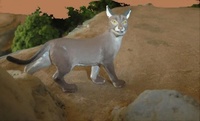
Country/State : France
Age : 65
Joined : 2018-10-24
Posts : 7252
 | |
  | |
bmathison1972

Country/State : Salt Lake City, UT
Age : 52
Joined : 2010-04-13
Posts : 6710
 |  Subject: Re: Mathison Museum of Natural History Subject: Re: Mathison Museum of Natural History  Wed Feb 10, 2021 1:40 pm Wed Feb 10, 2021 1:40 pm | |
| Species: Dynastes grantii Horn, 1870 (western Hercules beetle) About the Figure: Manufacturer: Epoch Series: Flying Beetles Year of Release: 2004 Size/Scale: Body length (including horns) 6.5 cm, within scale 1:1. Wingspan 11.7 cm. Frequency of species in toy/figure form (at time of posting): Uncommon Miscellaneous Notes: Wow, the same species coming up twice in a three-day period! That's the thing about randomness, it could happen! There is some assembly required for this figure. It attaches to a habitat-style base with a black plastic rod, from which it is removable. About the Animal: Geographic distribution: Southwestern United States, northern Mexico Habitat: Subtropical woodlands, particularly in the pine-oak transition zones, and often in riparian areas. Diet: Larvae feed in rotting wood of several trees; adults feed on tree sap, primarily of Fraxinus velutina (Arizona ash). IUCN Status (at time of posting): Not Evaluated Miscellaneous Notes: While D. grantii has not been formally evaluated by the IUCN, it is considered a 'Species of Greatest Conservation Need' (SGCN) in New Mexico and may be at high risk of endangerment due to the effects of the emerald ash borer ( Agrilus planipennis), an Asian buprestid that has become a forestry pest in North America. [You must be registered and logged in to see this image.] |
|
  | |
Caracal

Country/State : France
Age : 65
Joined : 2018-10-24
Posts : 7252
 | |
  | |
Bonnie

Country/State : UK
Age : 19
Joined : 2020-10-14
Posts : 5584
 |  Subject: Re: Mathison Museum of Natural History Subject: Re: Mathison Museum of Natural History  Wed Feb 10, 2021 2:48 pm Wed Feb 10, 2021 2:48 pm | |
| Beautiful!  |
|
  | |
widukind

Country/State : Germany
Age : 48
Joined : 2010-12-30
Posts : 45745
 |  Subject: Re: Mathison Museum of Natural History Subject: Re: Mathison Museum of Natural History  Wed Feb 10, 2021 7:28 pm Wed Feb 10, 2021 7:28 pm | |
| |
|
  | |
bmathison1972

Country/State : Salt Lake City, UT
Age : 52
Joined : 2010-04-13
Posts : 6710
 |  Subject: Re: Mathison Museum of Natural History Subject: Re: Mathison Museum of Natural History  Thu Feb 11, 2021 12:56 pm Thu Feb 11, 2021 12:56 pm | |
| Species: Argiope amoena Koch, 1878 (garden spider; kogane-gumo) About the Figure: Manufacturer: Bandai Series: Figure Pictorial Book of Gakken Insect Year of Release: 2003 Size/Scale: Web base 6.2 cm long. Body length 2.0 cm, within scale 1:1. Carapace width 0.6 cm, which also calculates to 1:1 scale Frequency of species in toy/figure form (at time of posting): Very rare Miscellaneous Notes: For the longest time this figure was unique, until late 2020 when Kaiyodo produced A. amoena in their Kumucolle! collection within the Capsule Q Museum line. This Bandai figure sits upon a web-style base; it does not appear to be safely removable the base (but I dare not try too hard for fear of breakage). A small hymenopteran prey is painted on the underside of the web! The Kaiyodo figure, having been recently released at the time of this writing, is more readily available and is much more realistic. About the Animal: Geographic distribution: East Asia, Japan; invasive in Hawaii Habitat: Forests, fields and clearings with patches of dense vegetation, rice paddies, gardens Diet: Flying insects IUCN Status (at time of posting): Not Evaluated Miscellaneous Notes: Many orb-weavers spin zig-zag patterns into their webs, called stabilimenta. The purpose of the stabilimenta is not fully understood, but theories include 1) stability of the web, 2) attracting insect prey, 3) discourage birds from flying through them, or 4) enhance detection of vibrations when potential prey becomes stuck in the web. The true function is probably visual, since only diurnal araneids produce stabilimenta. [You must be registered and logged in to see this image.] |
|
  | |
Caracal

Country/State : France
Age : 65
Joined : 2018-10-24
Posts : 7252
 | |
  | |
widukind

Country/State : Germany
Age : 48
Joined : 2010-12-30
Posts : 45745
 |  Subject: Re: Mathison Museum of Natural History Subject: Re: Mathison Museum of Natural History  Thu Feb 11, 2021 7:35 pm Thu Feb 11, 2021 7:35 pm | |
| |
|
  | |
Bonnie

Country/State : UK
Age : 19
Joined : 2020-10-14
Posts : 5584
 |  Subject: Re: Mathison Museum of Natural History Subject: Re: Mathison Museum of Natural History  Thu Feb 11, 2021 10:03 pm Thu Feb 11, 2021 10:03 pm | |
| Very interesting with the web!  |
|
  | |
Roger
Admin
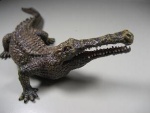
Country/State : Portugal
Age : 50
Joined : 2010-08-20
Posts : 35835
 |  Subject: Re: Mathison Museum of Natural History Subject: Re: Mathison Museum of Natural History  Thu Feb 11, 2021 11:11 pm Thu Feb 11, 2021 11:11 pm | |
| I also love to learn these details about the web. Everything has an explanation and Nature is still full of misteries. |
|
  | |
bmathison1972

Country/State : Salt Lake City, UT
Age : 52
Joined : 2010-04-13
Posts : 6710
 |  Subject: Re: Mathison Museum of Natural History Subject: Re: Mathison Museum of Natural History  Fri Feb 12, 2021 12:34 pm Fri Feb 12, 2021 12:34 pm | |
| Species: † Pteraspis rostrata (Agassiz, 1835) About the Figure: Manufacturer: Kaiyodo Series: Dinotales Series 2 Year of Release: 2001 Size/Scale: Body length (including rostrum) 9.0 cm for a scale of 1:2.22 Frequency of species in toy/figure form (at time of posting): Unique Miscellaneous Notes: Being one of the original Dinotales figures, some assembly is required. The figure is removeable from its base. About the Animal: Geographic distribution: Lower Devonian of modern-day Europe Habitat: Pelagic Diet: Marine invertebrates, small vertebrates IUCN Status (at time of posting): N/A [prehistoric] Miscellaneous Notes: Pteraspis rostrata did not have pectoral fins, but did have lateral growths that are believed to have functioned like hydrofoils for propulsion in water. The tail had a longer lower lobe, which would give the animal an upwards lift, suggesting a pelagic lifestyle rather than benthic. [You must be registered and logged in to see this image.] |
|
  | |
Kikimalou
Admin
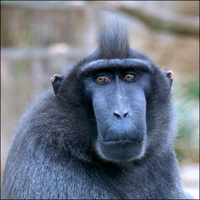
Country/State : Lille, FRANCE
Age : 60
Joined : 2010-04-01
Posts : 21169
 |  Subject: Re: Mathison Museum of Natural History Subject: Re: Mathison Museum of Natural History  Fri Feb 12, 2021 6:07 pm Fri Feb 12, 2021 6:07 pm | |
| A beauty, I would love to see more unusual species by Kaiyodo ! |
|
  | |
widukind

Country/State : Germany
Age : 48
Joined : 2010-12-30
Posts : 45745
 |  Subject: Re: Mathison Museum of Natural History Subject: Re: Mathison Museum of Natural History  Fri Feb 12, 2021 6:35 pm Fri Feb 12, 2021 6:35 pm | |
| |
|
  | |
bmathison1972

Country/State : Salt Lake City, UT
Age : 52
Joined : 2010-04-13
Posts : 6710
 |  Subject: Re: Mathison Museum of Natural History Subject: Re: Mathison Museum of Natural History  Sat Feb 13, 2021 12:57 pm Sat Feb 13, 2021 12:57 pm | |
| Species: Hyalessa maculaticollis (Motschulsky, 1866) (min-min cicada) About the Figure: Manufacturer: Yujin Series: Insects of Japan Vol. 1 Year of Release: 2001 Size/Scale: Figure length (including wings) 5.7 cm. Body length (excluding wings) 3.2 cm, within scale 1:1 Frequency of species in toy/figure form (at time of posting): Very rare Miscellaneous Notes: This species is usually marketed as Oncotympana maculaticollis. Some assembly is required. It is believed the Insects of Japan figures are cast from actual specimens, so they are all in the 1:1 scale. About the Animal: Geographic distribution: China, eastern Russia, Korean Peninsula, Japan Habitat: Forests, gardens Diet: Nymphs feed on subterranean plant roots; adults drink sap from trees IUCN Status (at time of posting): Not Evaluated Miscellaneous Notes: Hyalessa maculaticollis spends on average three years underground as a nymph. [You must be registered and logged in to see this image.] |
|
  | |
Kikimalou
Admin

Country/State : Lille, FRANCE
Age : 60
Joined : 2010-04-01
Posts : 21169
 |  Subject: Re: Mathison Museum of Natural History Subject: Re: Mathison Museum of Natural History  Sat Feb 13, 2021 1:36 pm Sat Feb 13, 2021 1:36 pm | |
| Those Yujin  ... how stupid I was 15 years ago  It is a wonderful model and a great pic Blaine  |
|
  | |
bmathison1972

Country/State : Salt Lake City, UT
Age : 52
Joined : 2010-04-13
Posts : 6710
 |  Subject: Re: Mathison Museum of Natural History Subject: Re: Mathison Museum of Natural History  Sat Feb 13, 2021 1:38 pm Sat Feb 13, 2021 1:38 pm | |
| |
|
  | |
widukind

Country/State : Germany
Age : 48
Joined : 2010-12-30
Posts : 45745
 |  Subject: Re: Mathison Museum of Natural History Subject: Re: Mathison Museum of Natural History  Sat Feb 13, 2021 5:40 pm Sat Feb 13, 2021 5:40 pm | |
| |
|
  | |
bmathison1972

Country/State : Salt Lake City, UT
Age : 52
Joined : 2010-04-13
Posts : 6710
 |  Subject: Re: Mathison Museum of Natural History Subject: Re: Mathison Museum of Natural History  Sun Feb 14, 2021 2:24 pm Sun Feb 14, 2021 2:24 pm | |
| Species: Allomyrina dichotoma (Linnaeus, 1771) (Japanese rhinoceros beetle) About the Figure: Manufacturer: Takara Tomy A.R.T.S. Series: B.I.G. Insects; B.I.G. Beetles Year of Release: 2015, 2017 Size/Scale: Body length (including horn) 11.0 cm for a scale of 2.75:1-1.4:1 (on average, roughly twice natural size) Frequency of species in toy/figure form (at time of posting): Very common Miscellaneous Notes: Allomyrhina dichotoma is the most-represented species in my collection, and this is the second time we've seen it in the Museum. These two figures represent the same sculpt, produced multiple times by Takara. The figure on the right is the 2015 release in the B.I.G. Insects collection; the one on the left is the 2017 release in the B.I.G. Beetles collection. Takara prints the year under the left elytron so it's easy to tell which is which. Some assembly is required and the figures are loosely articulated. About the Animal: Geographic distribution: Southeast Asia, including China, Korea, Taiwan, and Japan Habitat: Tropical and subtropical hardwood forests Diet: Larvae feed on organic detritus in soil; adults are attracted to sap flows IUCN Status (at time of posting): Not evaluated Miscellaneous Notes: Large scarabaeoid beetles spend most of their lives underground as larvae. The developmental cycle for A. dichotoma is roughly a year, from egg to adult. As adults, they live for only about four months and die after mating and oviposition. [You must be registered and logged in to see this image.] |
|
  | |
Caracal

Country/State : France
Age : 65
Joined : 2018-10-24
Posts : 7252
 | |
  | |
Sponsored content
 |  Subject: Re: Mathison Museum of Natural History Subject: Re: Mathison Museum of Natural History  | |
| |
|
  | |
| | Mathison Museum of Natural History |  |
|
